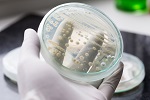
Just in case you think we humans rule the world, we're here to tell you, it's really the microbes that are in charge. These largely single cell creatures are all around us and among the most abundant life forms on earth.
We've been able to harness the microbe's remarkable abilities for more than a millennium. We use them to make foods such as beer and bread and in industry to make chemicals. That's all great but microbes that are pathogens also give us disease such as dental decay and intestinal disease. Up to sixty percent of all cancers may have a microbial origin, so they're definitely a Jekyll-Hyde dilemma for humans.
Recently, scientists made a surprising discovery that's a great example of this dilemma. Apparently, an industrial species of yeast, the Pichia kudriavzevii, used in sourdough bread, specialty beer and chocolate is the same as the pathogen Candida krusei, which causes yeast infections in humans. For all these years we didn't know because identifying yeasts was challenging work. But now with genome sequencing, it's become easier and more accurate.
When researchers sequenced thirty different strains of the two yeasts, they were greater than ninety-nine point five percent genetically identical. So they are indeed the same microbe. The concern is that they're both resistant to the antifungal, fluconazole which is the first line of defense against pathogenic yeasts.
The other concern is that since it's used industrially, people are in contact with the yeast. We may need to protect workers from infections, especially people with compromised immune systems or blood disorders. This unexpected discovery emphasizes the yin and yang of our relationship with microbes.
More Information
Two Fungal Species'One Pathogenic, One Benign'Are Actually the Same
Under one name the species is used in food fermentation, and under the other it is a drug-resistant cause of yeast infections...
Population genomics shows no distinction between pathogenic Candida krusei and environmental Pichia kudriavzevii: One species, four names
We investigated genomic diversity of a yeast species that is both an opportunistic pathogen and an important industrial yeast. Under the name Candida krusei, it is responsible for about 2% of yeast infections caused by Candida species in humans...